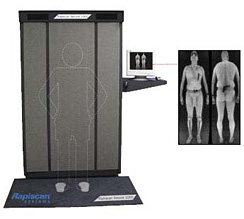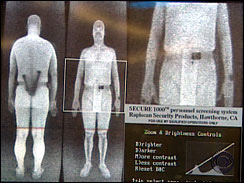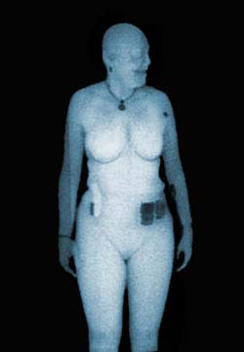 |
 |
 |
 Travel & Outdoors | February 2007 Travel & Outdoors | February 2007  
Critics Slam New Airport Scanner
 UPI UPI


| 
| 
| | New airline scanners called backscatters can peer through clothes. (CBS) |
A new U.S. airport scanner called a backscatter X-ray is drawing fire from critics who call it another blow to personal privacy.

CBS says X-rays penetrate clothing of the passenger standing in front of the scanner, generating a silhouette-like image.

A representative of the company that makes the machine says it is a key to finding weapons missed by metal detectors and traditional X-rays.

But, critics called it a digital strip-search after earlier versions were explicitly revealing. The new version is said to be not so graphic.

The backscatter will be tried out in Phoenix and, at first, will be voluntary, officials say.
New Airport Scanner Gets Personal
CBS

It's called a backscatter X-ray, but critics call it a digital strip-search, CBS News correspondent Bob Orr reports.

Here's how it works: A passenger stands in front of a large scanner, X-rays penetrate clothing, but bounce off the traveler's body. This generates a silhouette-like image.

"Here, down in the passenger's sock, you can see what's been concealed here is a ceramic knife," says Joe Reiss, explaining a demonstration.

Reiss, whose company makes the backscatter machine, says it's key to finding weapons and objects that metal detectors and traditional X-rays miss.

"It has the capability to find all types of weapons — not only guns and knives, but also explosive devices or even non-metallic weapons," says Reiss, vice president of American Science and Engineering.

But backscatter X-rays have been highly controversial. Earlier versions were explicitly revealing, capturing pictures in which people appeared nearly naked.

The new backscatter, which will be tried out in Phoenix, is not nearly that graphic. Its software adds privacy filters, and security officials stress the images will not be saved.

Passengers CBS News spoke with on Thursday in Phoenix weren't worried.

"I like it. I'd feel safer if I knew that was there," one male passenger says.

"It's pretty impressive that it just shows the outline of the body versus showing any private parts," a female passenger says.

But privacy advocates are still outraged.

"We're not convinced that it's necessary. We're not convinced that it's effective, and we think the privacy risk is serious and hasn't been fully explained to the public," says Marc Rotenberg, executive director of the Electronic Privacy Information Center.

At least at the outset, backscatter X-rays will be voluntary. Most passengers will pass right by them. And those who are singled out for extra screening can choose between a backscatter or a traditional pat down.

Security officials say backscatter strikes a fair balance between privacy and security, and that the technology eventually will spread to more airports.

But critics ask, how far will the government go to make us "safer?" | 
 | |
 |



